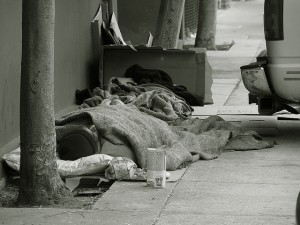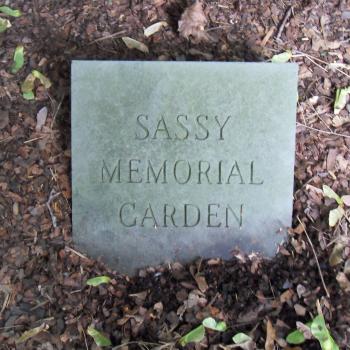 My daily bike-ride near downtown Tucson is not picturesque. It’s along a bike trail that’s squeezed between a highway and a tattered string of small factories and beaten down neighborhoods.
My daily bike-ride near downtown Tucson is not picturesque. It’s along a bike trail that’s squeezed between a highway and a tattered string of small factories and beaten down neighborhoods.
The bike trail is usually fairly abandoned when I ride it. Occasionally I’ll pass another biker or someone walking.
But I can always count on passing the man who lives under the overpass that’s an exit ramp from the highway.
It’s dark under that overpass. And he is dark: African American, wearing a dark-colored dirty jacket. He’s usually sitting in the least visible place possible: on the concrete, leaning against a post, his back to the bike trail. Sometimes he’s talking to himself, but usually he’s silent…just sitting or lying down. Near him is a shopping cart stuffed with what I assume are all his possessions. I can see a dusty gray wool blanket at the top; nothing else is clearly visible as I bike by.
He doesn’t seem dangerous, to himself or others. He is hiding…from others and from himself? Where does he get food, I always wonder. And what damage has been done to his psyche that he has chosen this life of self-imposed solitary confinement?
He seems so locked in with his solitude that I don’t dare stop to offer help; my guess is that this would frighten him.
But my husband and I have been concerned about him. Is there any agency looking after him? So my husband went to the folks at our neighborhood association, which the police use as an informal sub-station. Yes, they knew of him. One of the policemen said, “It’s because of the cutbacks to services; people that should be in institutionalized care are left to themselves.” “He’s crazy,” said another, but with compassion in his voice. “We’ll check in on him,” another said.
I shake my head in dismay. What kind of society have we created that people so hurt are not cared for? Are left on the sidewalk like the trash that has heaped to overflowing in the trashcan next to this man’s “home”?
But another part of me senses, whenever my bike approaches his home, that I’m passing through sacred ground. “You live here, Lord,” I’ve come to say to myself. And I always pray as I bike past him: “Lord, let him know that you are alive in him, in whatever way that he can recognize you.”
But I feel inarticulate in the face of the mystery of this man’s life. And when I feel inarticulate, I turn to poetry.
Eileen Myles expresses an appropriate sense of outrage in these lines from her “An American Poem”:
The homeless are wandering
the streets of our nation’s
greatest city. Homeless
men with AIDS are among
them. Is that right?
That there are no homes
for the homeless, that
there is no free medical
help for these men. And women.
That they get the message
—as they are dying—
that this is not their home?
I share these sentiments, but to my ear these lines belong more in a political protest speech than in a poem. Poetry, I feel, should be more nuanced, should have at least some element of reflectiveness. So I find the following poem by Ruth Stone speaking more profoundly of my relation to the man who lives under the overpass. The poem is called “Shapes.”
In the longer view it doesn’t matter.
However, it’s that having lived, it matters.
So that every death breaks you apart.
You find yourself weeping at the door
of your own kitchen, overwhelmed
by loss. And you find yourself weeping
as you pass the homeless person
head in hands resigned on a cement
step, the wire basket on wheels right there.
Like stopped film, or a line of Vallejo,
or a sketch of the mechanics of a wing
by Leonardo. All pauses in space,
a violent compression of meaning
in an instant within the meaningless.
Even staring into the dim shapes
at the farthest edge; accepting that blur.
I like this poem’s images for that “violent compression of meaning / in an instant within the meaningless.”
Yet maybe the poetry that most powerfully articulates what I imagine as the cry of the man under the overpass himself is biblical. Living like a slave who longs for the shadow—as someone who truly lives in the shadow—this man might utter Job’s plaint in 7:1-6:
Do not human beings have a hard service on earth,
and are not their days like the days of a laborer?
Like a slave who longs for the shadow,
and like laborers who look for their wages,
so I am allotted months of emptiness,
and nights of misery are apportioned to me.
When I lie down I say, ‘When shall I rise?’
But the night is long,
and I am full of tossing until dawn.
My flesh is clothed with worms and dirt;
my skin hardens, then breaks out again.
My days are swifter than a weaver’s shuttle,
and come to their end without hope.
While for me it does help to hear what I imagine as this man’s spirit articulated in Job’s magnificent poetry, I don’t see, alas, how it can help him. All I see is his days “coming to their end without hope.”
Originally published in Good Letters on May 4, 2012.
Peggy Rosenthal is director of Poetry Retreats and writes widely on poetry as a spiritual resource. Her books include Praying through Poetry: Hope for Violent Times (Franciscan Media), and The Poets’ Jesus (Oxford). See Amazon for a full list. She also teaches an online course, “Poetry as a Spiritual Practice,” through Image’s Glen Online program.












